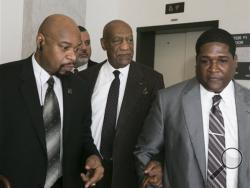NORRISTOWN, Pa. (AP) — As a sexual assault case against actor Bill Cosby moves forward, a key battle will be waged over explicit testimony he gave in a deposition more than a decade ago.
Montgomery County Judge Steven O'Neill on Wednesday rejected the testimony of a former suburban Philadelphia prosecutor who said he promised Cosby would never be prosecuted. The decision allows the case to move to a preliminary hearing on March 8.
Cosby, 78, was arrested in December and charged with drugging and violating former Temple University athletic department employee Andrea Constand at his suburban Philadelphia home in 2004. The TV star could get up to 10 years in prison if convicted. He has not yet entered a plea.
At issue will be whether a civil deposition Cosby gave can be used in the criminal case. In his deposition, Cosby admitted that he had affairs with young models and actresses, that he obtained quaaludes to give to women he wanted to have sex with and that he gave Constand three pills at his home. He said he reached into her pants but insisted it was consensual.
In 2005, then-Montgomery County District Attorney Bruce Castor decided the case was too flawed to prosecute. But Castor's successors reopened the investigation last year after Cosby's lurid, decade-old testimony was unsealed at the request of The Associated Press. Dozens of other women also came forward with similar accusations that destroyed Cosby's nice-guy image as America's Dad. This is the only case in which he has been charged.
O'Neill issued his ruling after a hard-fought two-day hearing. He said witness credibility was a factor but he did not elaborate.
In another setback for the defense, the judge also denied a request to disqualify newly elected Montgomery County District Attorney Kevin Steele from the case. Cosby's lawyers had accused Steele of making a "political football" out of Cosby during his political campaign.
Cosby, who in his deposition called himself "one of the greatest storytellers in the world," remained silent in court this week.
His lawyers tried to get the case thrown out with help from Castor, who testified at the hearing that he intended to forever close the door on prosecuting the comedian. He said he considered his decision binding on his successors.
The promise was made to Cosby's now-deceased lawyer.
"In this case, the prosecution should be stopped in its tracks," Cosby lawyer Chris Tayback argued. "Really what we're talking about here is honoring a commitment."
Steele challenged Castor's credibility and questioned whether the former DA ever made such an agreement, since it was never put in writing on a legal document. He argued that in any case, Castor had no legal authority to make such a deal.
"A secret agreement that allows a wealthy defendant to buy his way out of a criminal case isn't right," Steele told the judge.
"There's no other witness to the promise," O'Neill said. "The rabbit is in the hat and you want me at this point to assume, 'Hey, the promise was made, judge. Accept that.'"
On the witness stand, Castor defended his decision not to bring charges, citing among other things Constand's yearlong delay in going to police, her continued contact with Cosby, and suggestions that she and her mother might have tried to extort the comic.
Most of the back-and-forth in court hinged on the wording and interpretation of a 2005 press release in which Castor announced he would not prosecute Cosby. Castor found himself sparring with prosecutors over many seemingly inconsistent statements he made over the years on whether Cosby could still be charged.
Castor tried to make a comeback as DA last fall but lost to Steele in a hotly contested race, during which Steele ran ads criticizing Castor for not prosecuting Cosby when he had the chance.
More than 50 women have accused Cosby of drugging and sexually assaulting them since the 1960s, but the statute of limitations for prosecuting the comic has run out in nearly every instance.

